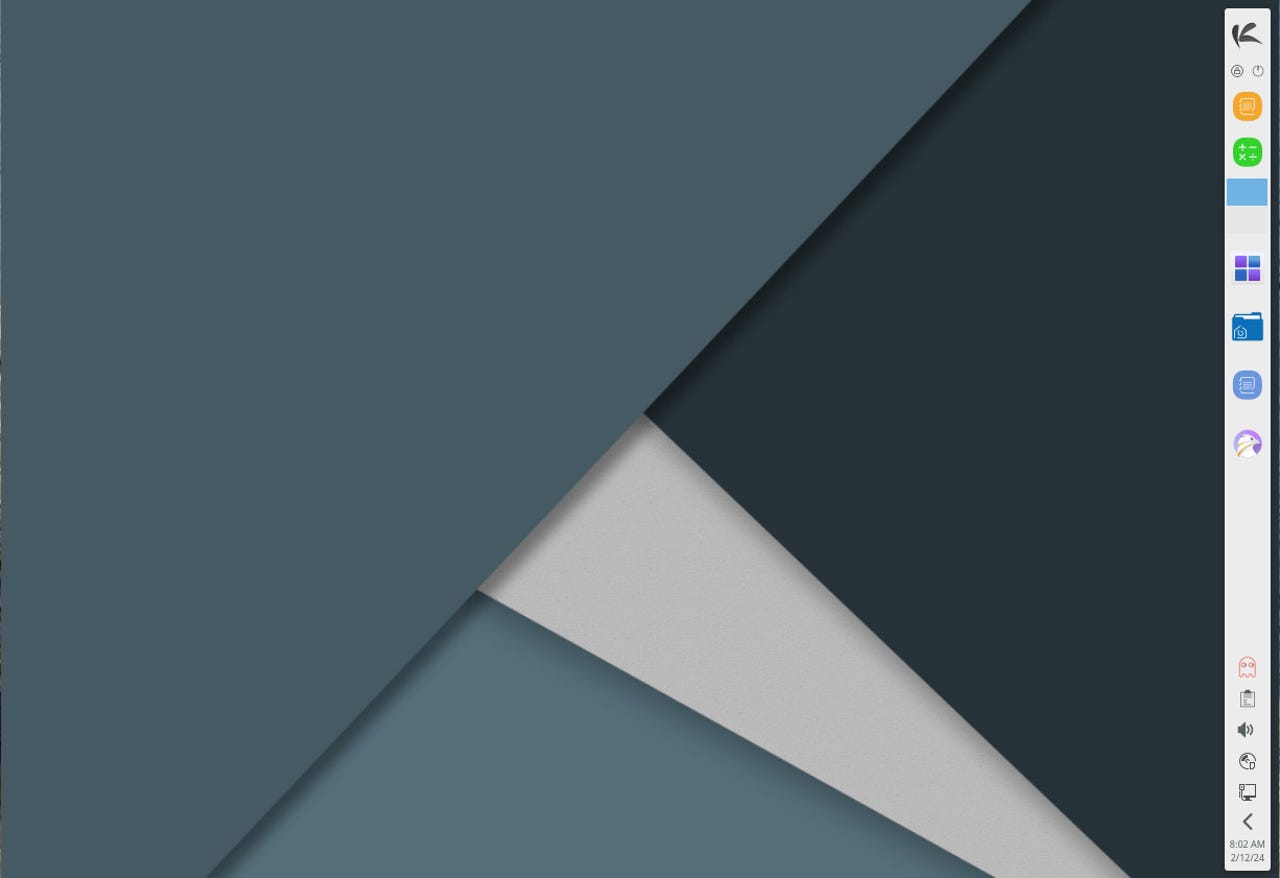
































KaOS 2024.01 lays out KDE Plasma with the panel on the right for a unique look.
KDE Plasma 6 has been creeping up to the doorstep of release for some time and we knew one distribution would be brave enough to launch it first. Well, it turns out that distribution was KaOS Linux and they've taken KDE Plasma 6 and turned it into a glorious desktop operating system that would make just about anyone happen to use.
Instead of going the traditional route of the same-old-same-old panel at the bottom desktop, the KaOS team delivers a slight variation of the theme and places the panel on the right side of the display, giving it a slightly unique look. To my pleasant surprise, they've also gone with a light theme as the default (where most distributions seem to be convinced everyone wants a darker take on the UI).
Also: The best Linux laptops
I decided to test KaOS 2024.01 via VirtualBox and found the installation failed to complete the task. No matter how many times I attempted the installation (or how many configuration options I tried), the installer would conk out when adding the bootloader.
Because of that, I had to do all of my testing in Live mode (which means the operating system was running in RAM and not from the hard drive). That's fine because I can still get the full KDE Plasma 6 experience, as the KaOS team intended. My feeling is the installer probably bonked because the release is using the RC 2 version of KDE Plasma 6. And, sadly, there's no way to upgrade the Live instance (because I cannot find the password for the live instance).
The big ticket item is KDE Plasma 6. What does this latest milestone release offer? First off, it's Wayland by default. That doesn't mean X11 is gone. If you have an application that has yet been ported to the Wayland display protocol, you can opt to switch to X11.
As far as software installation, KaOS shuns the KDE Plasma default, Discover, in favor of the Octopi GUI (since this is an Arch-based distribution), which is not quite as user-friendly as the Discover app that is included with other KDE Plasma-based distributions. However, Octopi is tightly integrated with KaOS, so it's a necessity.
Although Octopi might not be as user-friendly as Discover, it still makes installing apps easy.
Other changes include:
KDE Plasma 6 also ships with a floating panel, which is a subtle, but effective change to help make the desktop look slightly more modern.
Overall, KDE Plasma 6 just feels faster and (even though I was testing with an RC 2 candidate) more stable.
Also: Deepin 23 aims to reclaim the title of the most beautiful Linux desktop
As far as installed applications, you'll find the Elisa music player, KDE Connect (to sync your phone and desktop), NeoChat, Seafile, Falkon (web browser), Haruna Media Player, Kate (text editor), and LibreOffice (among others). You'll also find FMPEG 6, Boost/ICU stack, Linux kernel 6.6.14, and Systemd 254.9.
You'll find all of the installed applications in the K menu at the top right corner of the desktop.
The one glaring miss is an email client. This is strange given this is KDE Plasma, which unusually includes KMail. Fortunately, KMail (or another email client, such as Thunderbird) can be installed via Octopi.
Who is KaOS 2024.01 for? This is a tough question to answer, mostly because in its current state (at least for me), the distribution cannot be installed. Even if I was able to successfully install KaOS 2024.01, I would have to say this release should probably only be considered by those who are anxious to see what KDE Plasma 6 has to offer (and how KaOS configures it).
Also: 5 Linux productivity apps I depend on every day, and how to install them from Snap
However, once KaOS includes the public release of KDE Plasma, it'll be a game-changer and I would recommend it to anyone who has a modicum of Linux experience. I am always hesitant to recommend Linux distributions that tend to go their own way (with regards to package management) to those new to Linux because they are never as user-friendly as, say, Ubuntu or Linux Mint.
I can say that KDE Plasma 6 is the most elegant iteration of the desktop the team has ever released, and KaOS 2024.01 does it justice. But for daily usage, you would be best served by waiting until KDE Plasma 6 is released to the general public before unleashing KaOS on your desktop.
If you're interested in testing KaOS 202401, you can download the ISO image from the official download page.
 Tags chauds:
technologie
Tags chauds:
technologie